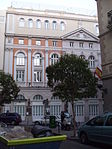Convent of the Salesas Reales
Bien de Interés Cultural landmarks in MadridConvents in SpainMonasteries in MadridNational supreme court buildings

The Convent of the Salesas Reales is an 18th-century architectural complex in central Madrid, Spain. Formerly a convent, specifically the convent of the Visitación de Nuestra Señora (Visitation of Our Lady), it was constructed and occupied by the Order of the Visitation of Holy Mary, which had been founded by St. Francis de Sales and St Jeanne de Chantal. The convent's church (dedicated to St Barbara) is now a parish church, and the remainder of the complex houses the Supreme Court of Spain.
Excerpt from the Wikipedia article Convent of the Salesas Reales (License: CC BY-SA 3.0, Authors, Images).Convent of the Salesas Reales
Calle del General Castaños, Madrid
Geographical coordinates (GPS) Address Phone number Nearby Places Show on map
Geographical coordinates (GPS)
| Latitude | Longitude |
|---|---|
| N 40.424527777778 ° | E -3.6938722222222 ° |
Address
Parroquia de Santa Bárbara (Iglesia de las Salesas Reales)
Calle del General Castaños 2
28004 Madrid (Centro)
Community of Madrid, Spain
Open on Google Maps










